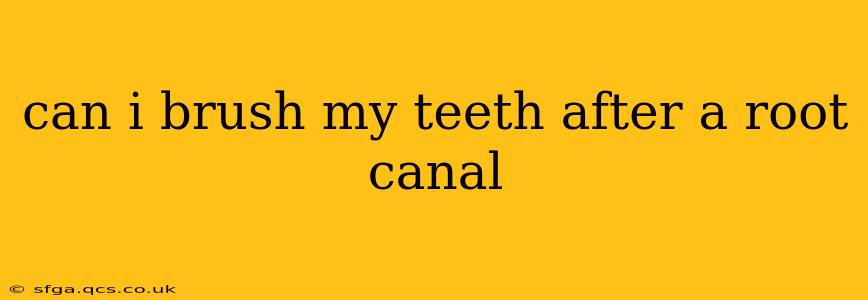Undergoing a root canal procedure is a significant step in preserving your tooth's health. Afterward, proper oral hygiene is crucial for healing and preventing complications. So, the short answer is yes, you can brush your teeth after a root canal, but with some important caveats. Let's delve into the details.
When Can I Start Brushing After a Root Canal?
You can usually resume brushing your teeth gently the same day as your root canal. However, it's essential to be mindful of the temporary filling or crown placed during the procedure. Avoid aggressively brushing or flossing directly on the treated tooth for at least 24 hours. Your dentist will provide specific post-operative instructions tailored to your situation.
How Should I Brush After a Root Canal?
Gentle brushing is key. Use a soft-bristled toothbrush and a fluoride toothpaste. Focus on brushing around the treated tooth, but be extra careful not to put excessive pressure on the area. Avoid scrubbing vigorously. Instead, use gentle, circular motions.
What if I Have Pain or Sensitivity After a Root Canal?
Some sensitivity or discomfort is normal in the days following a root canal. If you experience pain or sensitivity while brushing, try using a desensitizing toothpaste or a very soft-bristled toothbrush. If the pain is severe or persistent, contact your dentist immediately.
What are the potential complications if I don't brush my teeth properly after a root canal?
Neglecting proper oral hygiene after a root canal can lead to several issues:
- Infection: Bacteria can accumulate around the treated tooth, potentially leading to reinfection or inflammation. This could necessitate further treatment.
- Delayed Healing: Poor oral hygiene can hinder the healing process, prolonging discomfort and recovery time.
- Damage to the Temporary Filling/Crown: Aggressive brushing can damage the temporary filling or crown, jeopardizing the success of the root canal.
What kind of toothpaste should I use after a root canal?
A fluoride toothpaste is recommended for its cavity-preventative properties. If you experience sensitivity, a desensitizing toothpaste can provide relief. Your dentist can advise you on the most suitable toothpaste for your specific needs.
Can I floss after a root canal?
Yes, you should floss gently after a root canal, but only after 24 hours. Avoid flossing directly on the treated tooth until then. Use a gentle flossing technique, avoiding pressure on the area.
How long does it take to fully recover from a root canal?
Full recovery time varies, but typically you'll experience most of the healing within a week or two. Some lingering sensitivity might persist for several weeks. Regular follow-up appointments with your dentist are essential.
What should I do if I notice swelling or excessive bleeding after a root canal?
If you experience swelling or bleeding that doesn't subside within a day or two, contact your dentist immediately. These could indicate a potential complication requiring prompt attention.
Following your dentist's post-operative instructions diligently is paramount for a successful root canal and a swift recovery. Remember, consistent gentle brushing and flossing, along with regular dental checkups, are key to maintaining excellent oral health.
